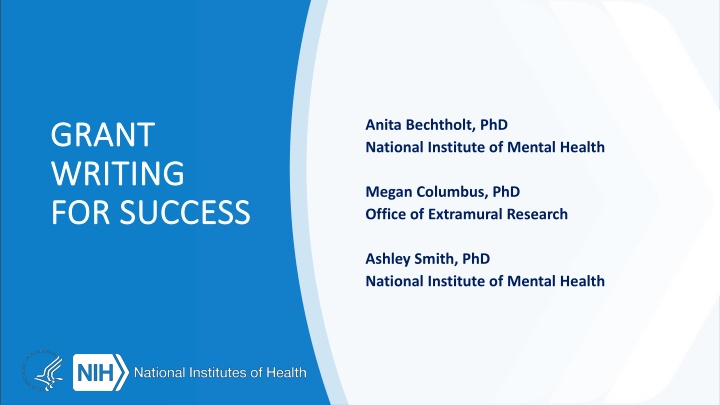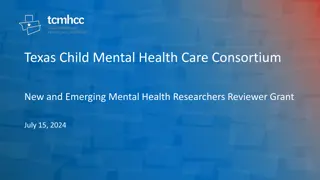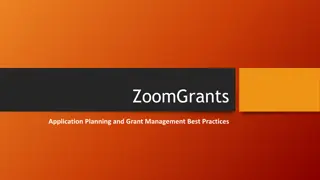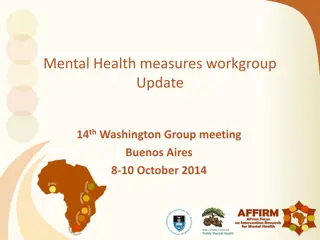Grant Writing Tips and Strategies for Success in Mental Health Research
Discover essential grant writing tips and strategies for success in mental health research with insights on finding the right grant type, engaging with program officers, and navigating the grant life cycle. Explore resources such as the NIH Matchmaker tool and learn how to plan effectively for grant applications.
Download Presentation

Please find below an Image/Link to download the presentation.
The content on the website is provided AS IS for your information and personal use only. It may not be sold, licensed, or shared on other websites without obtaining consent from the author.If you encounter any issues during the download, it is possible that the publisher has removed the file from their server.
You are allowed to download the files provided on this website for personal or commercial use, subject to the condition that they are used lawfully. All files are the property of their respective owners.
The content on the website is provided AS IS for your information and personal use only. It may not be sold, licensed, or shared on other websites without obtaining consent from the author.
E N D
Presentation Transcript
Anita Bechtholt, PhD National Institute of Mental Health GRANT GRANT WRITING WRITING FOR SUCCESS FOR SUCCESS Megan Columbus, PhD Office of Extramural Research Ashley Smith, PhD National Institute of Mental Health
TIPS OVERVIEW Find a home for your application Contact Plan ahead Program Official Read and understand the FOA Be sure to follow instructions Identify the right grant type Align Watch a mock study section Make life easy for reviewers application with review criteria General advice
THE GRANT LIFE CYCLE START PLANNING EARLY
FIND A HOME Matchmaker tool in NIH RePORTER Browse strategic plans, portfolio areas, research priorities Use NIH Guide to identify relevant Funding Opportunity Announcements (FOAs) https://reporter.nih.gov/matchmaker https://grants.nih.gov/funding/searchguide/index.html#/
FINDING CONTACTS https://projectreporter.nih.gov/
CONTACT YOUR PROGRAM OFFICER (PO, PD, Program Official, Program Director) Early
WHAT TO DISCUSS WITH PROGRAM OFFICER? Your idea - provide specific aims page Fit/Priority for Institute or Center (IC) Grant Type and Funding Opportunity Announcements (FOAs)
IDENTIFY THE RIGHT GRANT TYPE Early Career Faculty K-Awards: K01, K08, K23 Graduate/Medical Student Research Education Grant: R25 Dissertation Grant: R36 Research Project grants: R01, R21, R03 NRSA Fellowships: F30, F31 Diversity Supplements Institutional Training Grant: T32 Loan Repayment Program Research Residency (MDs): R25 Diversity Supplements Post-Doctoral Fellow NRSA Fellowship: F32 K-Awards: K99/R00 Institutional Training Grant: T32 Research Education Grant: R25 Diversity Supplements Loan Repayment Program
EARLY STAGE INVESTIGATOR (ESI) Designation matters for R01 applications ESI = never awarded an R01; within 10 years of terminal degree Applications reviewed together Funding preference Extensions - childbirth, disability, family care responsibilities, natural disasters, active-duty military, etc. https://grants.nih.gov/policy/early-stage/index.htm
GRANTS.NIH.GOV/GRANTS/HOW-TO- APPLY-APPLICATION-GUIDE.HTML
IN THE GUIDE Funding Opportunity Announcements (FOA)s Request For Applications (RFA) Program Announcement (PA), PAR, PAS R is for special receipt date or review process S is for set-aside funds Activity Code - R01, R03, R15, R21 etc
READ AND UNDERSTAND THE FOA Participating ICs, purpose, review criteria, responsiveness
FOLLOW INSTRUCTIONS https://grants.nih.gov/grants/how-to-apply-application-guide.html
WATCH A MOCK STUDY SECTION https://www.youtube.com/watch?v=fBDxI6I4dOA
ALIGN APPLICATION WITH REVIEW CRITERIA Significance Career Development Plan Investigator Innovation Approach Environment
MAKE LIFE EASY FOR REVIEWERS Leave white space Guide the reviewers with graphics, bold, italics Make sure figures & legends are readable Write clearly and concisely Edit & proofread Write for both experts & non- experts in your field
GENERAL ADVICE Study successful grant applications Share drafts with anyone who will read them Be prepared to rework your ideas Rationale for methodological choices Plausibility versus feasibility Don t overlook statistics Keep up on publications Be realistic Be explicit Persist!
Clear significance, important problem, high impact High degree of novelty and innovation Demonstrated track record of a well- qualified applicant Clear rationale Relevant, supportive preliminary data Clear approach that will provide unambiguous results Careful attention to detail - spelling, grammar, error bars etc. BETTER SCORED GRANTS
Low impact, descriptive, incremental projects Too ambitious, lacking focus, too many unrelated aims, aim dependence Unclear hypothesis or rationale Lack of appropriate expertise Approach flawed with no discussion of pitfalls or alternative approaches Questionable feasibility WORSE SCORED GRANTS
REVISING AND RESUBMITTING Talk with Program Officer Opportunity to improve the application Acknowledge and accept the help of reviewers Write clear introduction section Address criticisms thoroughly Respond constructively and respectfully
STAY INFORMED NIH Guide Listserv - updates on notices for grant policies, guidelines, and FOAs http://grants.nih.gov/grants/guide/listserv.htm Open Mike - A biweekly blog written by NIH s Deputy Director for Extramural Research https://nexus.od.nih.gov/all/category/blog/open- mike/ COVID-19 Information The latest guidance and information https://grants.nih.gov/policy/natural- disasters/corona-virus.htm























